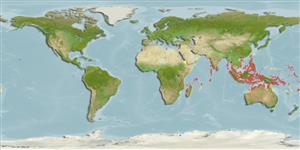Common names from other countries
>
Eupercaria/misc (Various families in series Eupercaria) >
Labridae (Wrasses) > Corinae
Etymology: Halichoeres: Greek, als, alis = salt + Greek, choiros = pig (Ref. 45335).
More on author: Bleeker.
Environment: milieu / climate zone / depth range / distribution range
Ecologia
marinhas associadas(os) a recifes; intervalo de profundidade 5 - 15 m (Ref. 90102). Tropical
Indo-West Pacific: known at present only from Sri Lanka to Indonesia. Male Halichoeres nebulosus and Halichoeres margaritaceus have always been misidentified as Halichoeres kawarin, which may be responsible for attributing a greater range to this species.
Tamanho / Peso / Idade
Maturity: Lm ? range ? - ? cm
Max length : 12.0 cm TL macho/indeterminado; (Ref. 48636)
Descrição suscinta
Chaves de identificação | Morfologia | Morfometria
Identified by cheek and body patterns. Most similar to H. binotopsis and is best distinguished by the more angular versus horizontal cheek lines (Ref. 48636).
Found in shallow coastal reefs, mainly rock substrates with soft coral and algal growth. Occurs in small loose groups dominated by a large male (Ref. 48636). May also be found solitary (Ref. 90102).
Ciclo de vida ou comportamento de acasalamento
Maturities | Reprodução | Spawnings | Egg(s) | Fecundities | Larvas
Distinct pairing during breeding (Ref. 205).
Randall, J.E., 1980. Two new Indo-Pacific labrid fishes of the genus Halichoeres, with notes on other species of the genus. Pac. Sci. 34(4):415-432. (Ref. 2136)
Status na Lista Vermelha da UICN (Ref. 130435)
CITES (Ref. 128078)
Not Evaluated
Ameaça para os humanos
Harmless
Uso pelos humanos
Pescarias: espécies comerciais; Aquário: Espécies comerciais
Ferramentas
Relatórios especiais
Baixar XML
Fontes da internet
Estimates based on models
Preferred temperature (Ref.
115969): 26.6 - 29.2, mean 28.7 (based on 2004 cells).
Índice de diversidade filogenética (Ref.
82804): PD
50 = 0.5000 [Uniqueness, from 0.5 = low to 2.0 = high].
Bayesian length-weight: a=0.00955 (0.00451 - 0.02020), b=3.09 (2.92 - 3.26), in cm Total Length, based on LWR estimates for this Genus-body shape (Ref.
93245).
Nível Trófico (Ref.
69278): 3.4 ±0.5 se; based on size and trophs of closest relatives
Resiliência (Ref.
120179): Elevada, tempo mínimo de duplicação da população menor que 15 meses (Preliminary K or Fecundity.).
Fishing Vulnerability (Ref.
59153): Low vulnerability (10 of 100).
